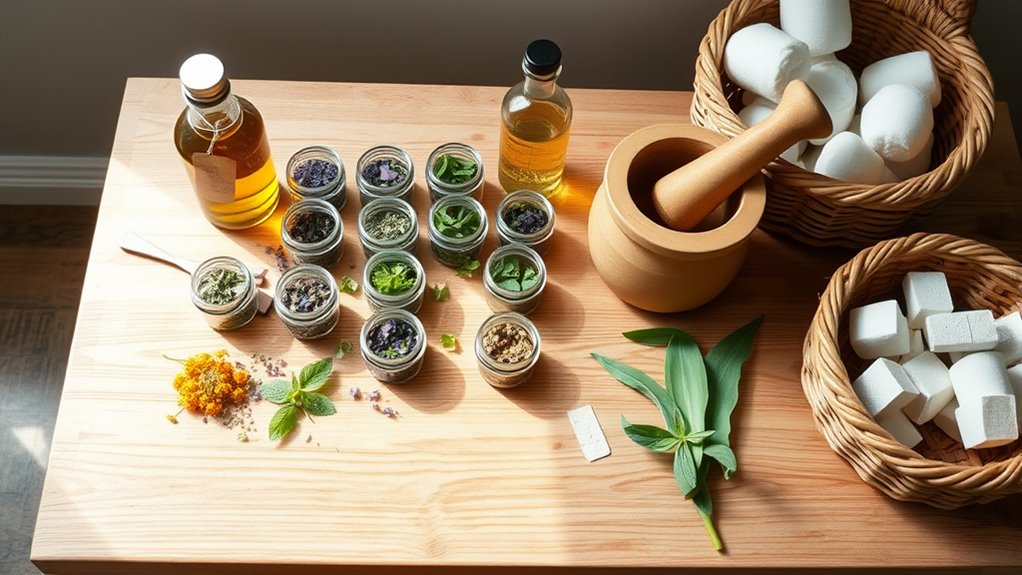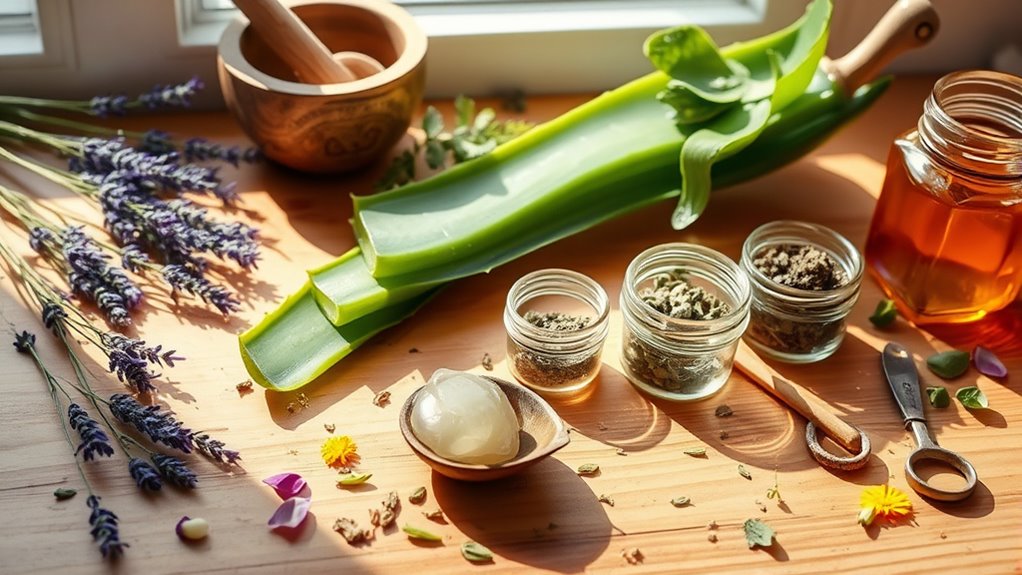You can manage minor injuries at home using simple natural remedies like herbal tinctures, which are made by soaking herbs in alcohol or vinegar for added potency. Natural antiseptics such as tea tree oil, honey, or a turmeric and honey paste help prevent infection and promote healing. Household ingredients like apple cider vinegar or aloe vera also provide quick relief for skin irritations. Keep exploring to discover more effective ways to use these remedies safely and effectively.
Key Takeaways
- Prepare herbal tinctures by soaking herbs in alcohol or vinegar to create potent, long-lasting first aid remedies.
- Use natural antiseptics like tea tree oil and honey to disinfect wounds and promote healing safely.
- Combine household ingredients such as turmeric, honey, and apple cider vinegar for quick, effective minor injury treatments.
- Incorporate homemade herbal remedies into a comprehensive first aid kit for accessible, natural wound care.
- Always use natural remedies for minor issues and seek professional medical advice for serious or persistent health concerns.

When it comes to managing minor health issues and everyday ailments, DIY home remedies offer a simple, cost-effective solution. One effective approach is harnessing herbal tinctures, which are potent extracts made by soaking herbs in alcohol or vinegar. These tinctures are versatile and easy to prepare, making them a valuable addition to your natural first aid kit. For minor cuts, scrapes, or insect bites, herbal tinctures like calendula or echinacea not only help speed healing but also act as natural antiseptics. Applying a few drops directly onto the affected area can reduce infection risk and soothe inflammation. You can also create your own herbal tinctures at home by steeping herbs in a clean jar with high-proof alcohol, then letting them sit for several weeks. Once strained, these tinctures last long, providing a convenient way to deliver medicinal herbs in a concentrated form. Including homemade herbal remedies in your first aid kit can also support your overall wellness and boost your immune response during minor illnesses.
Natural antiseptics are another cornerstone of DIY first aid. Unlike synthetic disinfectants, these substances come from nature and often have fewer side effects. For example, tea tree oil is renowned for its powerful antimicrobial properties and can be diluted with carrier oils to treat minor skin infections or prevent bacterial growth on cuts. Similarly, honey, especially raw or Manuka honey, is a natural antiseptic with a long history of wound healing. Its antimicrobial qualities help keep wounds clean and promote tissue regeneration. Incorporating these natural antiseptics into your first aid routine can considerably reduce reliance on commercial antibiotics and chemical disinfectants, which sometimes cause irritation or resistance.
In addition to herbal tinctures and natural antiseptics, you can also use common household ingredients for quick remedies. For example, applying a paste of turmeric and honey can help treat minor burns or cuts due to turmeric’s anti-inflammatory and antiseptic properties. Apple cider vinegar diluted in water can serve as a gentle rinse for soothing sore throats or minor skin irritations. Always remember, though, that while these remedies are effective for minor issues, they’re not substitutes for professional medical advice when facing serious health concerns.
Frequently Asked Questions
Are Homemade Remedies Safe for Children and Pets?
You should be cautious with homemade remedies for children and pets, as natural ingredient safety isn’t always guaranteed. Not all herbal remedy preparations are safe or suitable for young or sensitive animals. Always research thoroughly and consult a healthcare professional before trying any herbal remedy on children or pets. Proper herbal remedy preparation minimizes risks, but it’s best to err on the side of caution to avoid potential adverse effects.
How Long Should I Wait Before Seeking Professional Medical Help?
When considering the timing for emergencies, you should seek professional medical help immediately if symptoms worsen, persist beyond a few hours, or if you’re unsure about the severity. Trust your instincts—if the injury or condition feels serious, don’t wait. When to see a doctor depends on the situation, but don’t hesitate to get urgent care if there’s significant pain, bleeding, or signs of infection. Always prioritize safety and prompt medical attention.
Can Herbal Remedies Replace Prescribed Medications?
You might wonder if herbal remedies can replace prescribed medications, but their herbal efficacy varies. While some herbs offer benefits, they shouldn’t be seen as prescription alternatives without consulting a healthcare professional. Relying solely on herbal remedies can be risky, especially for serious conditions. Always speak with your doctor to determine the best treatment plan, ensuring safety and effectiveness rather than assuming herbs can fully substitute prescribed medications.
What Are Common Allergic Reactions to Herbal Remedies?
You might experience allergic sensitivities to herbal remedies, with symptoms like itching, swelling, or redness. Some people develop herbal contact dermatitis, a skin reaction caused by direct contact with certain herbs. Always test a small amount first and watch for signs of an allergic reaction. If you notice any discomfort, stop use immediately and consult a healthcare professional to prevent more serious issues.
How Do I Store Homemade Herbal First Aid Supplies?
To store your homemade herbal first aid supplies, follow proper storage tips to maintain their effectiveness. Keep them in airtight containers, away from direct sunlight, heat, and moisture. Label each item with the date made to track shelf life. Typically, herbal remedies last from several months up to a year, depending on ingredients. Regularly check for signs of spoilage, and discard any that change in color, smell, or texture.
Conclusion
Remember, while DIY home remedies and herbal first aid can be effective for minor issues, they shouldn’t replace professional medical care when needed. Trust your judgment, but don’t hesitate to seek a healthcare provider if symptoms worsen or don’t improve. These natural remedies are great for immediate relief and supporting your health, but they’re not a substitute for expert advice. Use them wisely and prioritize safety—your health is worth it.










